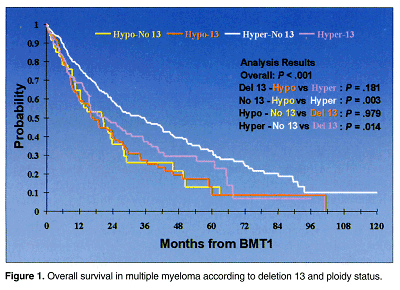Chromosomal Abnormalities Predict Poor Outcome in Multiple Myeloma
LITTLE ROCK-Deletion of chromosome 13 and hypodiploidy are major independent predictors of poor prognosis in multiple myeloma, according to a study involving close to 1,500 multiple myeloma patients (ASCO abstract 1054). "Chromosomal studies are the most important prognostic factor in the treatment of myeloma," said lead investigator Guido J. Tricot, MD, PhD, head of the Academic Division of Myeloma Transplant, Myeloma Institute for Research and Therapy, at the University of Arkansas for Medical Sciences in Little Rock. "Chromosome 13 deletion and hypodiploidy are associated with poor prognosis, but too many institutes are failing to do these studies which can predict outcome and help customize treatment."
LITTLE ROCKDeletion of chromosome 13 and hypodiploidy are major independent predictors of poor prognosis in multiple myeloma, according to a study involving close to 1,500 multiple myeloma patients (ASCO abstract 1054). "Chromosomal studies are the most important prognostic factor in the treatment of myeloma," said lead investigator Guido J. Tricot, MD, PhD, head of the Academic Division of Myeloma Transplant, Myeloma Institute for Research and Therapy, at the University of Arkansas for Medical Sciences in Little Rock. "Chromosome 13 deletion and hypodiploidy are associated with poor prognosis, but too many institutes are failing to do these studies which can predict outcome and help customize treatment."
Although Dr. Tricot’s team has previously shown the adverse effect of chromosome 13 abnormalities, other researchers have suggested that hypodiploidy is the major prognostic factor in multiple myeloma. To confirm the relative effects of these markers, this study examined the outcome of 1,475 multiple myeloma patients who received their first transplant before July 1, 2000.
In this patient population, median age was 54 years, median beta-2-microglobulin was 2.3 mg/L, median C-reactive protein was 5.0 mg/L, and 40% had received more than 12 months of standard dose chemotherapy. Cytogenetic analysis revealed: hypodiploidy in 131 patients, including those with hypodiploid or hypotetraploid karyotype; pseudodiploidy in 82 patients; hyperdiploidy in 278 patients; and normal karyotypes in the remainder.
Risk-Adjusted Strategy
"Cytogenetic analysis is clinically important as a prognostic factor, and it is the most important single factor to predict the outcome of multiple myeloma," Elias J. Anaissie, MD, told ONI. He is coauthor of the study and professor of medicine and director of supportive care at the Myeloma Institute for Research and Therapy, University of Arkansas for Medical Sciences. "Our group uses a risk-adjusted strategy to optimize treatment. For patients with unfavorable genetics, we use a different approach."
Since event-free and overall survival were similar in pseudodiploid and hyperdiploid patients, these subgroups were combined into a nonhypodiploid group. Outcome was significantly worse in patients with hypodiploid than with nonhypodiploid or normal karyotypes. Median event-free survival was 10 months in hypodiploid patients, 19 months in nonhypodiploid patients, and 28 months in those with normal karyotypes (P < .001). Median overall survival was 19 months in hypodiploid patients, 36 months in nonhypodiploid patients, and 56 months in those with normal karyotypes (P < .001).
Regardless of ploidy status, patients with chromosome 13 deletion had similarly poor outcomes. Among patients with chromosome 13 deletion, median event-free survival was 12 months for those with hypodiploidy and 12 months in those with nonhypodiploidy, and median overall survival was 17 months and 22 months, respectively. Five-year event-free survival was 9% in those with hypodiploidy and 7% in those with nonhypodiploidy, and 5-year overall survival was 17% and 22%, respectively.
Figure 1 depicts overall survival rates according to both ploidy status and chromosome 13 deletion.

Tailored Therapies
"Now that we know exactly which cytogenetic abnormalities predict the prognosis, we can use different therapies depending on the genotype," Dr. Tricot said. Multivariate analysis revealed that the major negative prognostic factors were hypodiploidy/chromosome 13 deletion, pretransplant beta-2-microglobulin greater than 2.5 mg/L, and albumin less than 3.5 g/dL (P < .001 for all).
In 596 previously treated and untreated patients with none of these risk markers, median event-free survival was 30 months; overall survival was 59 months; 5-year event-free survival was 30%; and 5-year overall survival was 48%. In contrast, among 317 patients with two or more of these poor prognostic factors, median event-free survival was 11 months; overall survival was 16 months; 5-year event-free survival was 3%; and 5-year overall survival was 4% (P < .001). Patients with a single risk factor had intermediate outcomes.
"Not only all patients with cytogenetic deletions of chromosome 13, but also those with a hypodiploid karyotype without chromosome 13 deletions have a poor outcome," Dr. Tricot said. "Normally we do double autologous transplant, but for patients with a poor prognosis, we do a single transplant and mini-allotransplant. This is a more risky procedure, but it’s justified due to the worse prognosis."
Navigating AE Management for Cellular Therapy Across Hematologic Cancers
A panel of clinical pharmacists discussed strategies for mitigating toxicities across different multiple myeloma, lymphoma, and leukemia populations.